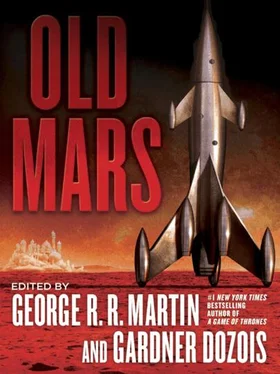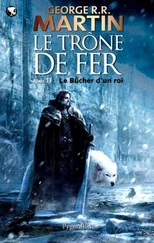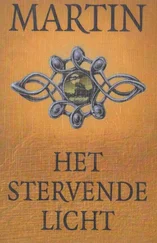In reply, Sexton thrust the filthy thing into Kidd’s hands. “What think you of this?”
The black lump was not coal at all but wood covered in coal dust. The Martians used small fragments of wood as kindling; this lump was much bigger than those, nearly as large as a fist, but apart from that it was not unusual. “It’s wood,” Kidd said with a shrug. “What of it?”
“The rings, man! Look at the rings !”
Kidd rolled his eyes, then peered closer … and his heart began to race. “From the curvature … this must have come from a tree at least three feet in diameter.”
“Exactly!” Sexton pointed to several similar lumps in the cloth basket. “And these are the same. Yet there’s not a tree to be seen anywhere near here.” He picked up a chunk of wood and held it up between them. “We must discover their source!”
 Kidd slogged to the top of a dune, surveying the horizon ahead through his telescope. “Nothing!” he called to Sexton. “Not a damned thing.”
Kidd slogged to the top of a dune, surveying the horizon ahead through his telescope. “Nothing!” he called to Sexton. “Not a damned thing.”
Not awaiting a response, he headed back down the dune, his feet sending cascades of the fine, cold sand sliding toward where Sexton sat rubbing his feet.
The natural philosopher’s face showed vexation and exhaustion both. “I would have sworn that adjective he used indicated a distance of between two and ten miles.” He took a drink from his waterskin. “My water’s over half-gone. Perhaps we should turn back.”
Kidd looked back along the well-trodden track they’d followed for the past four hours, then forward to where it vanished around a curve. “You’re certain he indicated this path? And that he understood what you were looking for?”
Sexton shrugged. “It’s a pox’d difficult language.”
Kidd took a sip of water, shielding his eyes against the sun, and considered their situation. It was nearly noon, and all they’d seen in four hours of walking was endless sand and mineral formations that had once seemed exotic. Though his own waterskin was not as depleted as Sexton’s, he too was tempted to abandon this snipe hunt. Yet it was the only hope they had.
He stared out across the desert. So much like an ocean, yet red and dry and motionless. And, unlike the sea, with its constant rush of wind and wave, oppressively silent.
No … not quite silent. Could that be …?
“My feet are—” Sexton began.
“Hush!” Kidd snapped, and cut him off with a gesture.
Kidd listened hard. And heard a sound he’d not heard in many months.
Axes. Axes chopping wood. The sound had been hidden from them before by the noise of their own feet on the sand.
They hurried forward, around the curve, and soon found themselves on the edge of a canyon perhaps two hundred feet deep. They’d been only a few hundred yards from it and had not even suspected its existence. A sandy track, apparently carved from the canyon wall by Martians, switchbacked down from the desert’s surface. And at the bottom …
“My God,” Kidd said.
The bottom of the canyon was thick with trees. Enormous trees, a hundred or even a hundred and fifty feet tall, each honey-blonde trunk rose straight and smooth from the dark loamy floor to a single great tuft of foliage just below the canyon’s lip. Groups of Martians moved among them, tiny at the feet of these towering giants.
As they watched, one of the trees fell gently, slowly, to the canyon floor. The Martians leapt upon the fallen giant and began hacking it into tiny pieces with their axes.
“What in God’s name are they doing?” Kidd cried.
“The growing conditions at the bottom of this canyon must be nearly unique,” Sexton mused. “But, as we’ve seen, coal is plentiful here. Perhaps they are so accustomed to burning coal that they must cut their wood into coal-sized chunks.”
Kidd shook his head. “Prisoners of habit.”
While Kidd stared down into the canyon, Sexton paced excitedly. “I must determine how these trees survive in the midst of a desert!” he muttered. “This could be my life’s work!”
At that statement, Kidd’s eyes went wide, and his already-dry mouth grew drier still. These trees were the final piece in the puzzle of how to return to Earth, but if he returned without Sexton, he’d face the noose anew.
Furthermore, he realized, he’d grown rather fond of the silly goose.
“But Sexton,” Kidd said, placing an arm around the philosopher’s shoulders, “if you make of these trees your life’s work, who will help us to rebuild the ship? Surely there are improvements to be made in the design.”
“Surely …” Sexton said, his eyes unfocusing as he considered the question.
“And once we are airborne, we must find a new prevailing wind to bear us homeward. For this, we may require new theories of the motions of air.”
“A difficult problem indeed.” Sexton patted his pockets for his notebook.
“Consider, too, the problem of bringing the trees, whole, out from this canyon, transporting them to the ship, and raising them up as masts.”
Sexton’s head came up suddenly. “Masts?”
“Masts,” Kidd acknowledged.
“But that’s exactly what we need!” said Sexton, and laughed.
“Masts!”
“Masts!” Kidd cried, and he too burst out laughing.
The two men held hands and danced around and around, bouncing with glee high into the thin Martian air.
Mars Adventure floated fifty feet above the sand, straining against her mooring cables. Above her loomed eight vast balloons, each slightly larger than before—an enormous crazy patchwork of bright Martian colors. They had taken up nearly every yard of fabric in the city, purchased with many weeks of backbreaking labor, but both Martians and Englishmen seemed pleased with the exchange.
The new masts were astounding—straight and smooth and so very light that they’d taken only half the crew to hoist out of the canyon and fit into place. And this was not merely the lighter weight of everything on Mars … these trees, products of a tiny, dry, and alien planet, bore a wood lighter and stronger than any on Earth. They’d packed the hold with as many logs as they could cram in. “We’ll build a whole fleet of airships!” Sexton swore, “and come back for more! We’ll make our fortune with these logs!”
“Not I,” Kidd told him.
Sexton blinked in astonishment, then grinned. “Surely the famous Captain Kidd does not lack in avarice?”
Kidd returned Sexton’s grin. “Have no fears on that score. Upon my return, I expect the gratitude of a king! And with those proceeds, I intend to settle down in Scotland, my ancestral home, with all the Ferintosh I can drink.” He leaned over the taffrail, looking down upon a city full of Martians, all a-chitter with excitement to see the great ship fly. “Fare thee well, ye great crabs!” he cried, then turned to the bosun. “Cast off!”
The men leapt into action, and, a moment later, with a great soaring bound, Mars Adventure sprang away into the blue Martian sky.
Considered by many to be the natural heir to Harry Turtledove’s title of King of the Alternate History novel, fast-rising science fiction star S. M. Stirling is author of the Island in the Sea of Time series ( Island in the Sea of Time, Against the Tide of Years, On the Ocean of Eternity ), in which Nantucket is cast back to the year 1250. He’s also produced the New York Times bestselling Change series: a first trilogy ( Dies the Fire, The Protector’s War, A Meeting at Corvallis ), followed by The Sunrise Lands, The Scourge of God, The Sword of the Lady, The High King of Montival, The Tears of the Sun , and Lord of Mountains , and his most recent book, The Given Sacrifice . Another alternate history series, The Lords of Creation, has two volumes: The Sky People and In the Courts of the Crimson Kings , set in a universe in which Mars and Venus were terraformed by mysterious aliens in the remote past. Most recently, he started a new series, Shadow-spawn, which consists of A Taint in the Blood, The Council of Shadows , and Shadows of Falling Night . He has also written stand-alone novels such as Conquistador and The Peshawar Lancers , and collaborated with Raymond F. Feist, Jerry Pournelle, Holly Lisle, and Star Trek actor James Doohan, as well as contributing to the Babylon 5, T2, Brainship, War World , and Man-Kzin War series. His short fiction has been collected in Ice, Iron and Gold . Born in France and raised in Europe, Africa, and Canada, he now lives with his family in Santa Fe, New Mexico.
Читать дальше

 Kidd slogged to the top of a dune, surveying the horizon ahead through his telescope. “Nothing!” he called to Sexton. “Not a damned thing.”
Kidd slogged to the top of a dune, surveying the horizon ahead through his telescope. “Nothing!” he called to Sexton. “Not a damned thing.”










